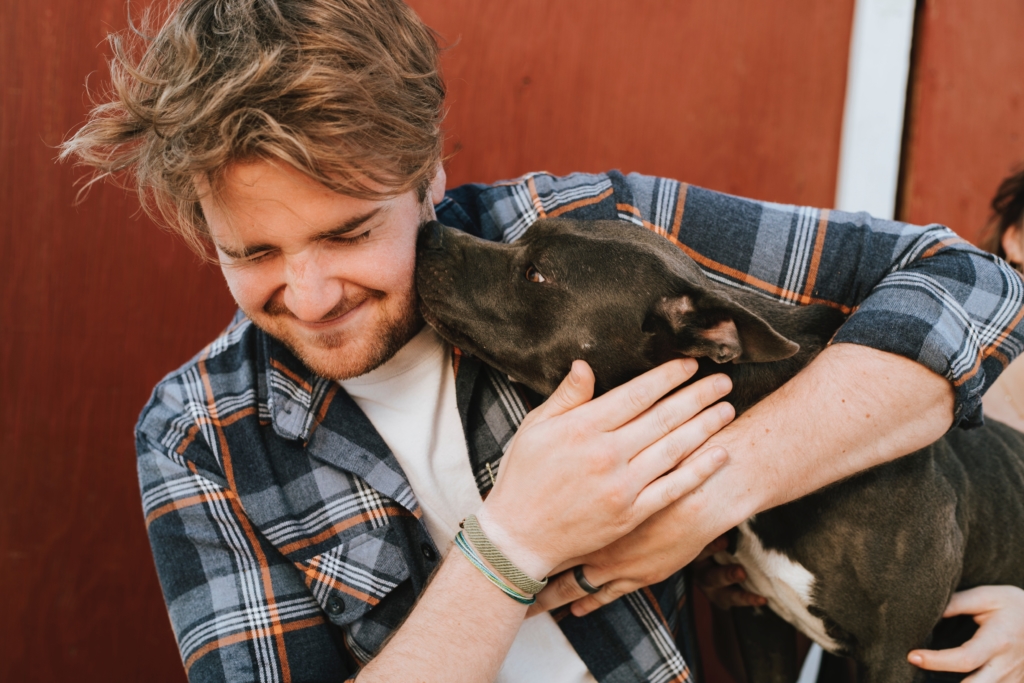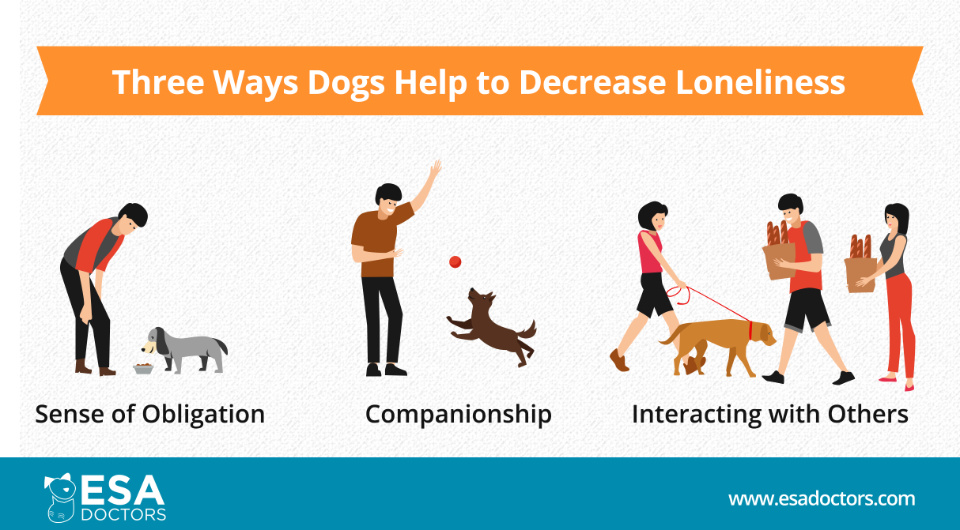Yes, emotional support dogs can help alleviate the feeling of loneliness in people as their presence provides companionship when they sit with their owner, welcome their owner home after work vs. the person coming to an empty house. Since they require exercise, going for a walk can help alleviate the feelings of loneliness as multiple studies like this one have shown.
An Emotional Support Dog may help
Loneliness may be an underlining symptom of depression, anxiety, or stress-related mental health issues. In such cases, a dog does not only help endure loneliness but can also support and ease the pain caused by the bigger issue. And you could be eligible to get an Emotional Support Dog.
Talk to your therapist or a legitimate LMHP online. The therapist will be able to evaluate if an Emotional Support Dog is good for your healing process, and can issue an ESA Letter. With the ESA letter in hand, you can apply for your dog to live with you in no-pet housing and college campuses.
Ready to qualify for an emotional support dog? Complete the questionnaire in the link below and a healthcare professional licensed in your state will assist you with your request.
What is Loneliness?
According to a poll from the American Psychiatric Association (APA), one in three Americans reports feeling lonely and socially isolated. Feelings of loneliness can impact mental health, causing depression and anxiety. However, the HRSA notes that loneliness can also affect a person’s physical health.
Loneliness is as dangerous to the body as smoking 15 cigarettes a day and more harmful than obesity.
The following social groups are more prone to feelings of loneliness and isolation:
- people who live alone
- those who have strained relationships
- older adults.
According to HRSA, 45% of older adults report feelings of loneliness. Part of this is how modern life has structured the family. The average household size has declined in recent decades, resulting in many people living alone.
Loneliness can also occur when living with other people. If a person feels disconnected or depressed from the people around them, loneliness can occur.
The American culture values individualism and independence, which makes people who live alone reluctant to ask for help or seek companionship from others. However, adopting a pet can provide that companionship, without having a person feel as if they’ve given up their independent lifestyle.

Canine Caring
There’s ample evidence that caring for a dog can alleviate feelings of loneliness. The Anxiety and Depression Association of America (ADAA) calls this occurrence the “pet effect.” 89% of pet owners consider their pets as part of the family, and 74% of pet owners report their pets to improve their mental health. Pets change the atmosphere of a room, perking people up, and banishing tensions.
The pet effect is so important that the field of human-animal bond research has expanded in recent years. After a millennium of hunting and gathering alongside humans, dogs have affected the human brain is such that distinct biomarkers in the brain can be measured to see how dogs change human emotions. The ADAA reports that the pet effect can be measured through the increase of oxytocin (a feel-good hormone) levels within the human brain when a dog is near.
The Human-Animal Bond Research Institute (HABRI) studies the relationship between humans and their pets. HABRI studies the impact of pets in a variety of settings from child health and development, mental and physical health, and aging. HABRI has amassed an online database that collects and classifies research and information about the science of the human-animal bond, proving the positive influence animals have on the human experience.
Improve your life. Connect with a Licensed Health Care Professional now.
How Dogs Help with Loneliness
Dogs are unlike any other animals. Bred and domesticated to work alongside humans for hundreds of years, dogs are especially adept at reading human emotions. They have been chosen, out of all other animals, to hunt, eat, and celebrate with humans. Which is why dogs have a specific place in human lives.
Dogs have human characteristics. Their faces and bodies are very expressive. They show visible signs of emotions, like tail wagging and barking. But dogs are different in that they don’t have the complicated parts of human interactions — they don’t pass judgment, aren’t hypercritical, and recover quickly from hurt or disappointment. Dogs have much of the good parts of companionship, and almost none of the bad!
There are major three ways dogs help to decrease loneliness:
- Providing a sense of obligation to another living being. Dogs are dependent on their owners to care for them. By having the responsibility to take the dog out for a walk or to feed a dog each day, the internal focus a lonely person has become an external focus towards the dog, making the person too busy to feel lonely. Dogs are also extremely thankful and demand attention, giving a lonely individual a boost of love.
- Through companionship. Most dogs enjoy the company and don’t like to be alone. They will follow you through the house, lie on your lap, and pat your leg when they need a hug or some cuddles. A dog is a constant companion, winning over even the hardest of hearts. Having a wagging tail and damp nose to greet you when you walk through the door can make any person feel less lonely.
- Attracting attention from other people. Most dogs enjoy being taken for a walk or a hike. Going outside on a routine basis with a dog opens up an owner to greetings and questions from other people, which provides an avenue to interact with others. Even simply being outdoors in the sunshine or obtaining regular exercise through dog walking can provide significant health benefits, both physical and mental.

Get your emotional support companion today
Does a dog help with loneliness? Yes! But a dog also helps with so much more. And if you are prone to depression, anxiety, or other physical or psychological health problems talk to your therapist about getting an Emotional Support Dog. As an ESA your dog can be by your side when you are traveling, living in housing with no pets policy, or away from home on a college campus. Dogs are not just a human’s best friend, but perhaps also their best cure.








You’re not allowed to bring her in public. Emotional support animals do not have public access rights. By using “an online registration card” you’re making it hard for legitimate service dog teams, like myself. Your ESA is covered for housing and that’s it.
I couldn’t imagine my life without both of my emotional support fur babies. Things have been so hard and even though we are homeless because my husband had a stoke and has been admitted fir some time. Without my girl’s I would’ve given up. They are truly a blessing and motivation for me
We’re so happy to hear about how much your ESAs have helped you!
I have had Cressy my my ESA (dog) for a year now. She is not very friendly in terms of wanting to be right next to me or giving kisses etc. That said, she has become invaluable in terms calming me when in public and feeling more secure when at home. I have an autoimmune disease, joint pain (with a couple replacements) and PTSD.
The only “protections” she qualifies for are for housing (can not be excluded from rental properties) and travel (including plane flights).
Both of these “protections” require a letter from your regular doctor.
I was able to get her an ID card through one of the Service Dog Organizations which helps with people who say she’s not allowed in businesses and public venues. But outside of housing and travel, it is up to the business owner/manager to allow her to stay with me.
Needless to say I tend to support businesses that support us.
I have an as a dog who was prescribed for me for anxiety after my husband’s death from cancer 7 years ago. He goes literally everywhere with me, to work, church classes, etc. He is small and very well behaved. A recent health scare on my part brought home my need for him when my anxiety shyrocheted and PTSD kicked in. My issue is with people who think an esa dog is not a real service dog and should not receive any special accommodations. Yes, some people have abused it, but to people like me, they are a lifeline. I do not appear impaired and lead a busy life, but the anxiety is there and my dear companion is very much needed. I am terrified they will pass laws, as some have threatened to do, which will deprive me of his company in many situations. I would like to see some advocacy for esa dogs in the news, instead of just the negative stories, and would be happy to tell our story if there was a platform to do it. I have tried writing to the advice columnists to present the other side when I read a disparaging article about esa dogs and so far my letters have not been printed. Esa dogs ARE real service dogs to those of us who count on them.
ESAs DO NOT have public access rights under federal law. I’m assuming you’re either in the states or Canada ‘cause anywhere else as far as I know ESAs are not a thing. Service animals are the ONLY companion animal allowed anywhere non pet friendly as they’re task trained to help mitigate said person’s disability or disabilities. Depending on the providence or state you live in faking a service dog is a misdemeanor and punishable of up 1,000 dollars (per occurrence), jail time, and or community service.
ESAs do not have the same public access rights as service dogs. ESAs are not protected by the ADA as service dogs are. ESAs only have rights in housing and for air travel.